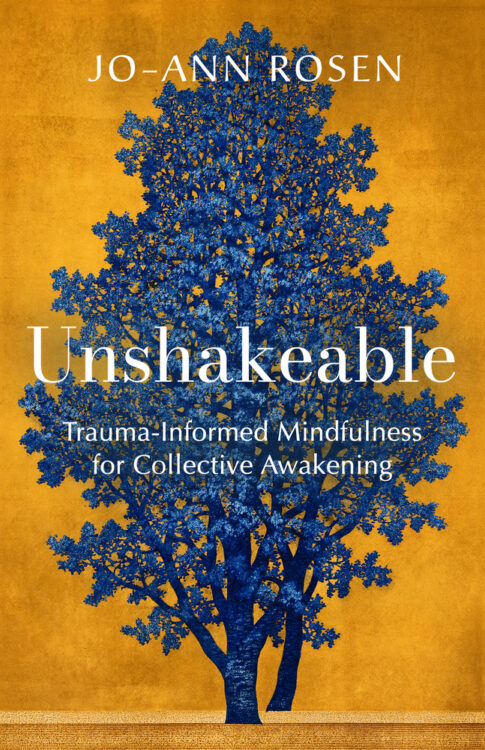Unshakeable: Trauma-informed Mindfulness for Collective Awakening
A Book Review
In her new book, Unshakeable, mindfulness teacher and psychotherapist Jo-ann Rosen condenses 2,600 years of Buddhism’s “very skillful means of encountering and overcoming adversity” and her own prodigious experience working in marginalized communities into a “neuro-informed” guide for individual and collective awakening.With its practical questionnaires, resources, and careful attention to bringing the reader along through a long-history of mindfulness, Unshakeable is profoundly important and timely guide for anyone who is called to serve humanity as an activist, wayfinder, and new cycle maker.

In its opening and throughout the book, Rosen shares stories and practices from her teacher, Thich Nhat Hanh, whom she acknowledges in the first chapter as the “mapmaker.” Hanh, the peace activist and Vietnamese Buddhist monk who founded Plum Village mindfulness centers worldwide, created this path from his “need to manage unbearable stresses… In the midst of devastation and destruction, he began to develop a path that helped to heal and, to some extent, prevent the psychological and spiritual wounds in the sea of fire that was Vietnam.”
Rosen’s retelling of Hahn’s life story in the first chapter brings the term “trauma-informed mindfulness” into full clarity. She helps the aspiring mindfulness practitioner understand the practices shared in Unshakeable were born from intense human trauma and suffering – through war, illness, and political persecution – as a means to find grounded balance and purpose in a fully-engaged life. From the outset, a great appreciation for the deceptively “simple” mindfulness exercises scattered throughout the book is rooted here.
Rosen addresses the greatest barrier to self-regulation for the Western mind: our enmeshed nature-phobia and separation consciousness myths. In her explanation of what it means to be “neuro-informed” she points out something that we spend a lot of time here at Kindred addressing as well, the fact that our millions-year-old nervous system “hasn’t had time enough to evolve and adapt to the unrelenting stresses in today’s world, and therein lies the very problem: we are navigating a twenty-first century lifestyle using a nervous system that evolved and adapted to serve the realities of the hunter-gatherer.”
The presentation of mindfulness history and integrated science in the opening of Unshakeable prepares the reader for a deep dive into their inner terrain with a trusted and experienced guide. Rosen shares self-deprecating and light-hearted stories like sitting with the “itch” in order to expand our window of tolerance that eventually matures into a compassionate relationship with one’s own mind chatter… and much later, the chatter and opinions of others.
Rosen finally brings us to the point of this book, after a long set-up and preparation for the promise of its subtitle, which is “Trauma-informed Mindfulness for Collective Awakening.” The need for community, for sangha, she writes, is “the foundation of all practice in the Plum Village tradition.” Rosen brilliantly visualizes and compares our human condition to deep snow that one, as an individual, can easily get stuck in; however, the collective, our community, can serve as a snowshoe. “When the collective is functioning optimally, the impact of the weight of our human shortcomings is spread out and the supportive nature of others can carry us beautifully on our journey.”
By the time we’ve traveled the well-crafted path Unshakeable offers, through neuro-informed practices and our deep need for community/sangha, the imperatives of “Growing a Healthy Sangha Body” and “Moving Toward Collective Awakening” (the last two chapters of the book) seem possible, even our birthright as a human species.


